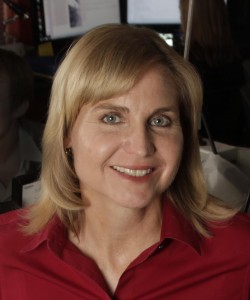Jennifer Kehlet Barton, Ph.D., Associate Vice President for Research and Professor, Biomedical Engineering at The University of Arizona has been named the 2012 Michael A. Cusanovich Bioscience Educator of the Year by the Arizona Bioindustry Association.
She will receive her award October 23, 2012 during the 2012 AZBio Awards which will be held at the Phoenix Convention Center and draw bioscience leaders from across the state of Arizona.
Dr. Barton was nominated by students, past and present with supporting nominations by her co-workers, and selected for this honor by an independent panel of judges from across the state of Arizona for her contributions to all aspects of bioscience education. They include her skill as a course instructor, her compassion and patience as a mentor and advisor to undergraduate and graduate students, her strategic leadership in creating a learning environment and career path for students via her development and leadership of the UA Biomedical Engineering Programs, her recent role as Assistant Director of the BIO5 Institute, and her participation with industry in a broad range of industry association and community groups.
Since Dr. Barton is well known in our community, we thought the best way to describe her is in the words of her students and her peers…
Dr. Barton has influenced and shaped my own career in significant ways. She was my instructor early in my graduate career, when she impressed me with her unusual knowledge about working in both research institutions and industry. After graduation I have maintained a close relationship with Dr. Barton and still have frequent brainstorming sessions with her, discussing industry partnership and STEM education. There is no better candidate for this Award, nor anyone to whom I feel more gratitude for my remarkable education, than my friend and mentor Dr. Jennifer Barton. — Patrick Marcus, Ph.D., President of Marcus Engineering, LLC
Professor Jennifer Barton has played a seminal role in the development of biomedical engineering at the University of Arizona. From her participation in the early stages of the GIDP [Graduate Interdisciplinary Program] to the establishment of the Biomedical Engineering Department in the College of Engineering. This role has not been just one of leadership in its development, but one of inspiration to those who worked with her and to the students she has mentored. Consequently, program has attracted top faculty members from a wide variety of areas of biomedical engineering as well as top students in Arizona and also throughout the US. Furthermore, many of those students have stayed in Arizona working the other educational institutions in the state, joining established biomedical companies, or starting their own companies. This is the ultimate benefit of education to society. I strongly recommend her for the AZBIO Bioscience Educator of the Year Award. — Linda S. Powers, PhD, Thomas R. Brown Chair for BioEngineering, Professor of Electrical and Computer Engineering, Professor of Biomedical Engineering
I met Dr. Barton when I was an undergraduate in the Biomedical Engineering Society (BMES) club on campus, where she is the faculty mentor. In BMES I saw her passion for teaching and research and I became interested in her research. I was able to find a home in Dr. Barton’s lab for my graduate research. Dr. Barton has been an excellent mentor during my PhD. She has always allowed me to pursue my interests and tailor my project to develop the skills I want for my career path. My weekly discussions with Dr. Barton have been invaluable in keeping me on track with my research and advancing my ability to ask critical questions and find new solutions to research problems. I am nominating Dr. Barton for the Educator of the Year Award because not only is she a great role model, but also she genuinely cares for all of her students and takes a personal stake in their success. On top of her duties as mother, wife, Professor, Head of BME and Assistant Director of BIO5 , she makes time to work in the lab with her students, attend student events, and individually mentor new students. —Jen Watson, PhD Student, Biomedical Engineering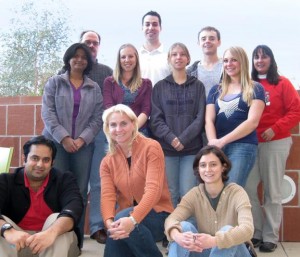
She is a true educator and responsible for the BME undergraduate program as it stands today. The program has been rapidly growing to over 100 students. Dr. Barton is a teacher who will rather teach a class sitting in a chair than cancelling it because of a cold or headache. She has significant administrative burden as department chair but still teaches our largest undergraduate class. As chair she is consensus driven and not interested in administrative politics. For her the outcome counts, and it does not matter how steep or difficult the path was to get there. Her national and international reputation is the one of a truly scientific scholar. And yes you can not escape her. She will greet you when you arrive at the Tucson airport and when you enter the BIO5 building through posters showing her face and work. — Urs Utzinger, Ph.D., Associate Professor, Biomedical Engineering
Initially, I had no idea that my optical sciences education had any practicality in the Bio-Medical research field. I walked into Dr. Barton’s lab unsure of whether I would be of any real help. Dr. Barton taught me that optical science has numerous applications spanning a wide variety of specialized fields. She helped ease me into the Bio-Medical scene, and sparked my interest with new uses of optical technology. Now I utilize my education in a new light, working on unique imaging systems for bio medical research. — JJ Katz, Undergraduate Student, Optical Sciences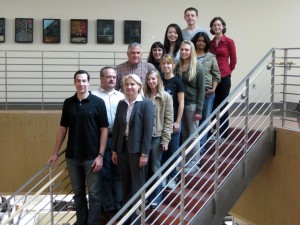
Dr. Jennifer Barton was the driving force behind the UA College of Engineering’s new Bio-Medical Engineering undergraduate program. In the past three years, the program has grown from 0 to 150+ students. The curriculum was designed by a team that was led by Dr. Barton and included faculty from four engineering departments as well as the UA College of Medicine and the College of Agriculture and Life Sciences. Dr. Barton was instrumental in developing a modern program that combines significant basic engineering with a strong set of applications classes. The program has expanded the student draw beyond the traditional engineering demographic boasting a 50-50 gender split. The graduates of the program are placed in medical school programs, graduate BME programs, and industry positions. Both Ventana Medical (Roche) and Gore Industries are partners of the program and Dr. Barton’s efforts have help draw generous donations to support students and their research via funds for laboratory equipment and student scholarships. Besides leading our undergraduate program, Dr. Barton has also been outstanding in graduate education. She led the University’s Graduate Interdisciplinary Program in Bio-Medical Engineering and has been a strong mentor to graduate students. She is the PI on our NIH T32 grant – Cardiovascular Biomedical Engineering. She has been the major advisor to 9 MS students and 6 PhD students since 2000. Her students have won 16 college/university/national level awards since 2001 and students are co-authors on approximately 1Ž2 of her journal publications. Dr. Barton also supports her students through tactical acquisition of extremely competitive grants including a multimillion dollar T32 Cardiovascular training grant which directly supports students in the biosciences and $2m worth of R01 NIH grants for cancer imaging.–Dr. Jeff Goldberg, Dean College of Engineering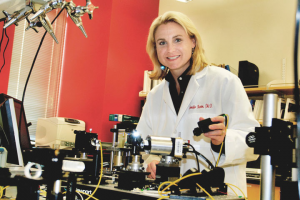
Dr. Barton was my Ph.D. advisor from 2005-2010. In addition to being a fount of knowledge, expertise, and impactful projects, she taught me how to approach problems neither of us knew the answers to – a prized and necessary skill in research. During my time in her lab, she would hold weekly individual meetings with each lab member, something I miss very much since I graduated and started working in another lab. This was my time to get feedback and ask questions one-on-one. After the first couple years, our meetings started going into overtime and instead of stopping me at the designated 30 minute mark she extended my scheduled meeting time to 1 hour.
Dr. Barton’s approach to research is at the same time inquisitive and practical. When I found I was spending a lot of time on a collaborative research project, which was interesting but unrelated to my dissertation studies, she encouraged me to pursue the project as an independent study which would count towards my coursework. This experience is representative of many of my experiences with Dr. Barton in the sense that if I wanted to do something, she would find a way to give me the time and resources to do it. In my final year, I wanted to pursue a couple research questions that were incredibly interesting but nonetheless unfunded. Dr. Barton supported me and helped me balance my funded lab work with these other projects, in some cases finding overlap between the two that I could take advantage of. I have since discovered that it is rare to find this type of managerial skill and dedication along with exceptional technical skills in the same person. I believe it comes from combining talent with the genuine desire to foster growth in her students. There is no question that Dr. Barton truly has her students’ best interests at heart. I am still in contact with Dr. Barton, and, while I don’t require an hour a week anymore, I don’t hesitate to email with technical and not-so-technical questions. Even now that I have graduated and left the lab, I still consider her to be my most valuable and trusted mentor. –Amy Winkler, PhD, Optical Sciences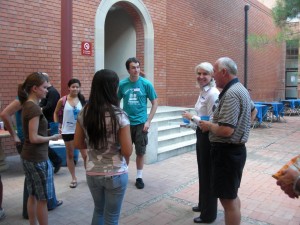
I took a class taught by Dr. Barton and she really encouraged me to continue in my studies of Biomedical Engineering. As I have worked in her lab, I further realize her many accomplishments and advancements which has inspired me to strive to improve the medical field as she has. –Ariel Nymeyer, Undergraduate Student, Biomedical Engineering
I am very grateful to have had the opportunity to work in Dr. Barton’s lab this summer. Sometimes, the projects and assignments for the KEYS program became very overwhelming. Dr. Barton patiently worked with me on my assignments and poster, and taught me many things about research. Not only does she take KEYS interns in her lab, but she also gives a presentation about Biomedical Engineering to all of the KEYS interns. After the presentation, all the KEYS interns were buzzing with excitement, and talking about how they want to major in Biomedical Engineering. Dr. Barton has truly inspired me, as well as many of the other KEYS interns, to stick with the field of science and make an impact in our community. By allowing me to work in her lab, Dr. Barton has motivated me to continue doing research throughout my undergraduate and graduate years at the U of A. She is a great educator and role model, and I am grateful to have had the opportunity to work with her. –Cait Myrdal, KEYS Laboratory Intern
Dr. Barton earned her master’s degree in electrical engineering from the University of California at Irvine, then worked for McDonnell Douglas (now Boeing) on the space station program before earning her PhD in biomedical engineering from the University of Texas at Austin. She joined the UA in 1998 and is a biomedical engineering professor with additional appointments in electrical and computer engineering, optical sciences, agriculture and biosystems engineering, and the Arizona Cancer Center.
In the biomedical research world, Barton is best known for the development of methods for the early detection of cancer. Her work has focused on advanced optical imaging tools, with resolutions that MRI or CT scans cannot match, that can peer inside the body and detect abnormal cells. She’ll continue her important research as part of her new position. She has authored more than 80 peer-reviewed publications, secured several grants from the National Institutes of Health, and is a fellow of SPIE — the International Optics Society — and the American Institute for Medical and Biological Engineering.
In April 2010, Barton was appointed head of the UA biomedical engineering department, the first new academic department established by the UA College of Engineering in more than 30 years. She has also served as assistant director of the BIO5 Institute and served as chair of the graduate interdisciplinary program for biomedical engineering from 2007 to 2011.
A new leadership role in 2012
In August, Barton added yet another role to her growing list of distinguished contributions at the University of Arizona when she was appointed to the new position of associate vice president for research, a job that involves expanding collaborative research efforts campus-wide and strengthening partnerships with the private sector.
Barton will focus on growing federal and state research funding and private sector support to expand facilities shared by the university’s colleges, and give researchers across campus access to the most advanced equipment and expertise.
Learn more about this outstanding educator at:
Arizona Engineer: “UA Selects Head of Biomedical Engineering to Help Lead University Research”.
Inside Tucson Business: “Jennifer Barton is a Woman Who Wears Many Hats”
Arizona Engineer: “College Establishes First New Department in 30 Years — Biomedical Engineering”
YouTube: Jennifer Kehlet Barton (Innovation Day 2009 – The University of Arizona)
Acknowledgements:
AZBio would like to thank Dr. Patrick Marcus and Jen Watson for their contribution in collecting the materials for both Dr. Barton’s nomination and the words of her students and peers, and to our independent panel of judges for their support in the evaluation of the wonderful candidates that were nominated this year.
To learn more about the 2012 AZBio Awards, visit www.azbioawards.com

